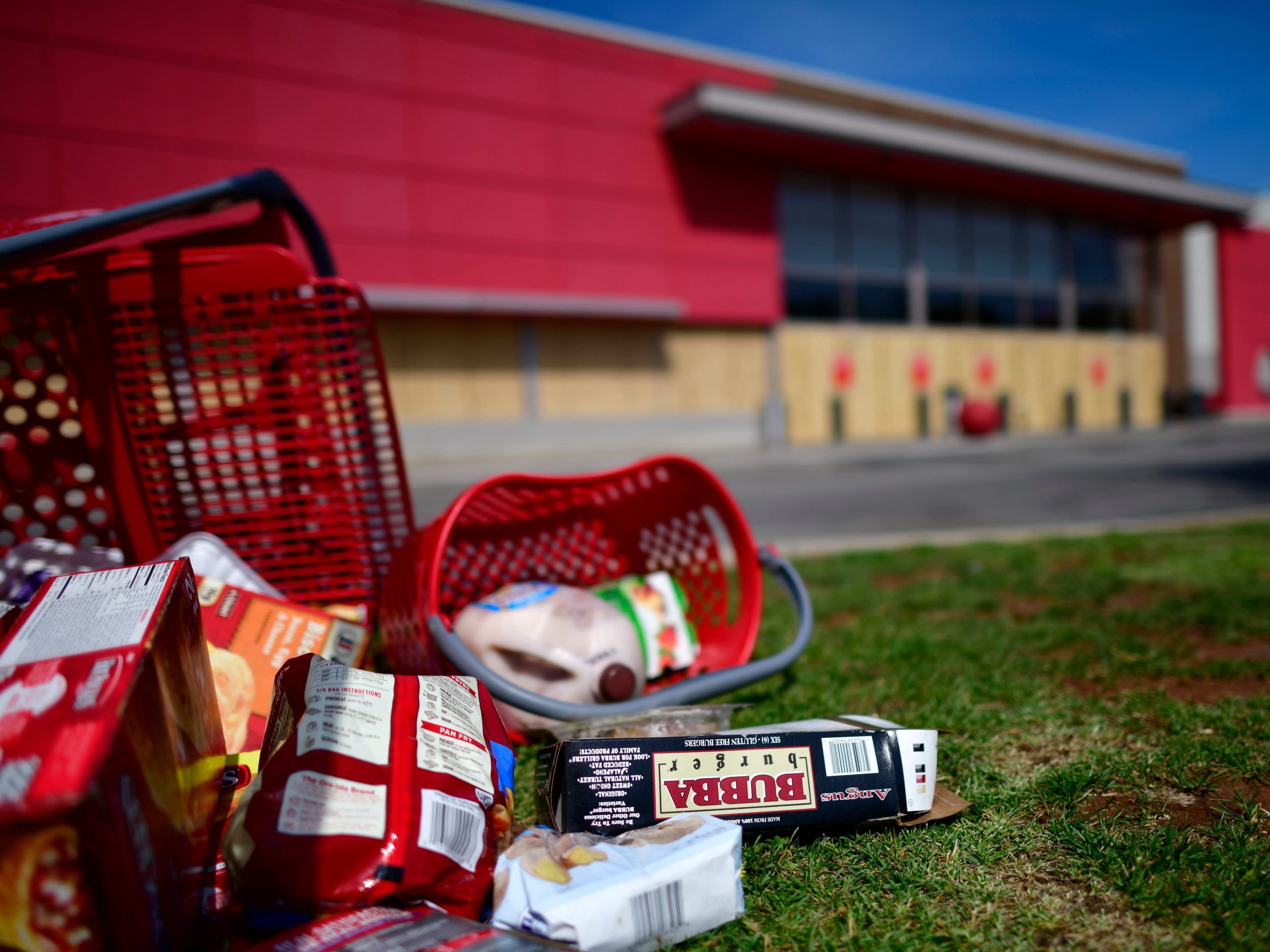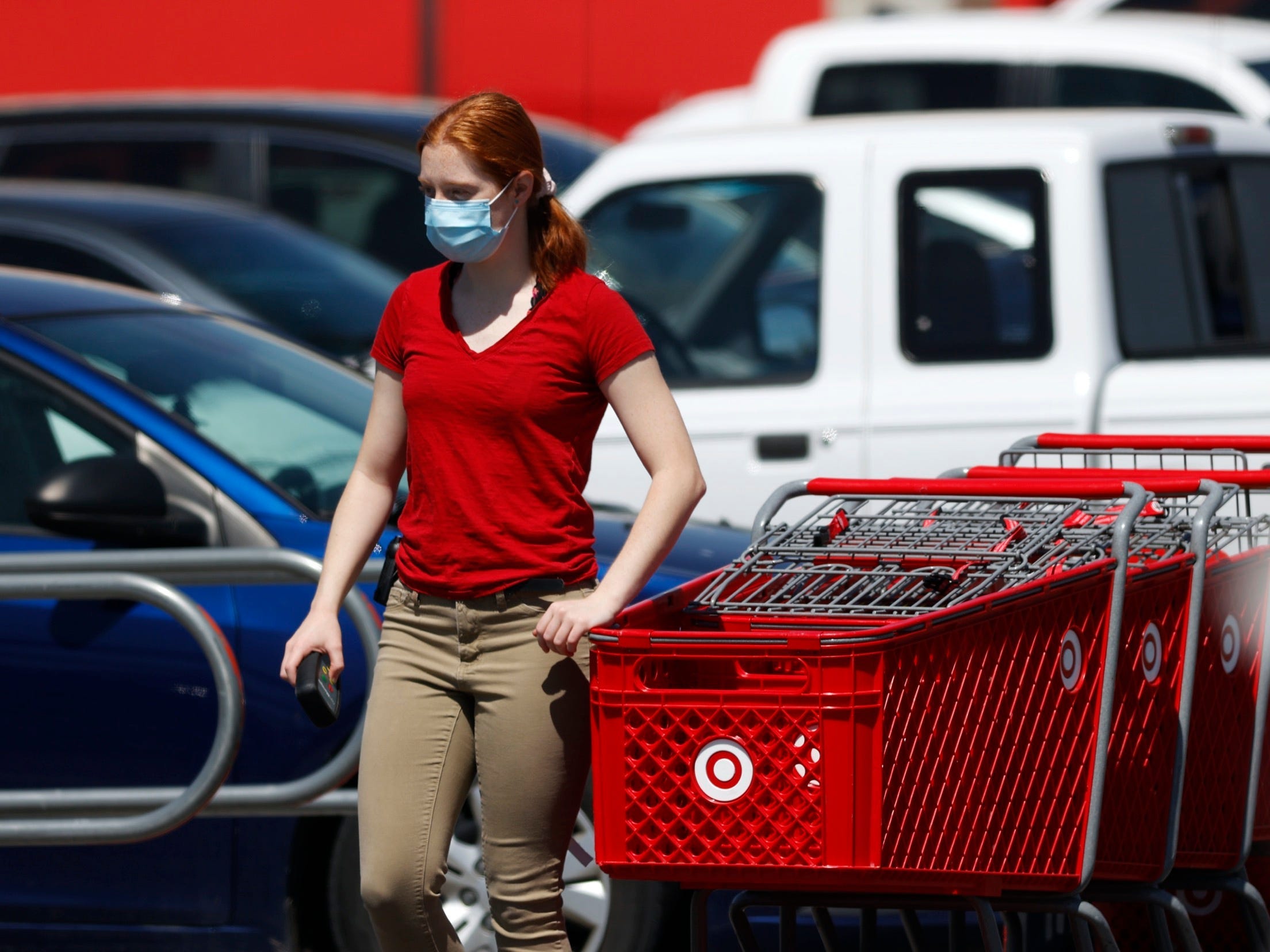
- A viral TikTok video is calling Target’s approach to shoplifters into question.
- Seven former and current Target employees across the US confirmed that it is common for the retailer to not immediately apprehend certain shoplifters and wait for the total value of the stolen items to reach a certain amount.
- Some said that this policy helps Target monitor and catch its high volume shoplifters on larger charges. A loss prevention expert said that retailers might not report every minor theft incident in order to maintain a good relationship with local police.
- “We don’t have any policies in place to hold or bundle shoplifting charges until they reach a felony level,” a Target spokesperson said in a statement.
- Visit Business Insider’s homepage for more stories.
At a Target in Las Vegas, the store’s approach to shoplifting has caused one former employee to speak out.
Isaiah Arellano, a former Target employee who worked at a North Dakota Target location in 2016, and transferred to a Las Vegas location in 2018, recently went viral on TikTok for his video explaining how Target addresses its shoplifters.
“They will continue letting you steal, all the while they’re documenting the value amount of every single item that you are stealing,” said Arellano in the video. “They will wait until it reaches or exceeds the amount that makes it grand theft larceny, which is an actual felony.”
The parameters that classify the degree of a theft charge vary across different states. For example, in Nevada, the stolen property must exceed $1,200 in value for the charge to go from misdemeanor to felony. In general, to be charged with grand theft or larceny, a person must be suspected of stealing more than what would constitute a charge of petty theft, a more minor theft charge with less serious repercussions.
Arellano's video was a response to another TikTok from influencer Dessy Joseph. In her original video, Joseph described Target's policy of monitoring repeat shoplifters and waiting for them to accumulate a higher value of stolen merchandise before taking action against them. In Arellano's video, he says, "She is 100% telling the truth." His TikTok has racked up more than 8 million views since it was posted on November 27. Arellano has over 28,000 followers.
Arrellano told Business Insider he felt confident speaking out about this after working in two different Target locations and seeing how they operated.
"If we saw somebody acting suspicious, it wasn't up to us to confront them," he said.
In a statement to Business Insider, a Target spokesperson said the company does not "bundle" charges until they reach a felony-level and would not provide details about the company's procedures for handling theft.
"We don't have any policies in place to hold or bundle shoplifting charges until they reach a felony level," a Target spokesperson said in a statement.
"At Target, we prioritize the safety and well-being of our guests, team members and the communities we serve," the statement continued. "Like most retailers, we have security practices, training, and technology in place to address shoplifting in our stores."
However, according to at the six other former and current Target employees Business Insider spoke to across Minnesota, Michigan, Virginia, New York, and California, the claims in the video are based on actual store policies.
Target headquarters monitors crime
Target's "asset protection team members," or the retailer's in-store security team, are responsible for monitoring and preventing theft in stores. According to a former employee who worked in asset protection in a Minnesota store until July, shoplifting is usually addressed right away in the store unless the situation is deemed too dangerous.
However, this employee added that there are instances where Target might decline to apprehend a shoplifter because of a general strategy the retailer has when it comes to tracking theft.
"Headquarters tracks the people who are impacting the stores the most," this former Minnesota Target employee told Business Insider in an email interview. "Sometimes we are told to only collect information but do not apprehend. This is because a Target Investigator is working with law enforcement to press charges and get these people arrested for a long time."
The reason for this, this former employee said, is to put a stop to the high-volume shoplifters who are a serious threat to the store. If such individuals are only arrested on minor charges, they'll likely return and continue to steal.
"The people that Target waits to build a case on are not your run of the mill shoplifter; these are professional thieves," the former Minnosota employee said, relating his own experience of seeing the same person sent to jail for minor thefts multiple times, only to see him continue to steal.
"Most of the people get cited and released," he said. "These high impact people do not care if they get arrested."
A current employee in a New York Target said the asset protection employees often track Target's "career shoplifters" and "have a binder full of people" with evidence of theft.
These employees, like most that were interviewed for this story, were granted anonymity in order to speak more frankly about the policies at Target.
Maintaining a relationship with police
With online marketplaces allowing criminals to surreptitiously unload a high volume of stolen goods online, organized theft has lately become more common in a retail setting, explained Jason Brewer, the executive vice president of communications for the Retail Industry Leaders Association (RILA).
"This trend has accelerated during COVID, and stores are often dealing with more brazen, and sometimes violent attempts at stealing mass quantities of merchandise," Brewer said. "Loss prevention tactics and strategies are designed to mitigate this alarming trend, and protect employees and customers."
General practices in loss prevention suggest that documenting theft and waiting to apprehend may have something to do with maintaining a positive relationship with local police.
When operating a big-box store, building a relationship with local police is essential, explained retail loss prevention and security expert John Hassard. While some police departments might be happy to prosecute every instance of theft across the spectrum, many police departments are often swamped with heavier crimes. According to Hassard, it is up to a retailer to determine which crimes are worthy of a call to the police to ensure that justice is able to be maintained in the most efficient way.
"It's not typical to call the police in retail when you've suffered a loss and you don't have a person," said Hassard, explaining why a retailer might undergo a process of documenting and tracking multiple thefts from one individual.
Hassard, who has close to 30 years of experience in loss prevention, said it is up to the retailer to determine how they will go about prosecuting criminal activity in its stores - and if and when it is the right time to call the police.
"There are retailers that say, 'We won't call a police if we catch a shoplifter who has below X amount of dollars,'" he explained. This can change depending on the retailer and location of the store.

Tracking employees
According to at least three former and current Target employees, Target also tracks shoplifting among its employees and will often wait to apprehend employees who are stealing.
"Target watches employees for theft more than they do customers," said a former Target employee who left his job in April of 2018 after 17 years at Target. "They're easier targets and a lot less risk."
A former Target employee in Virginia who left his job in early 2018 said he witnessed management track an employee who was stealing in 2017. In this case, he said, the store manager was aware of a co-worker who was pilfering items from the storeroom for about six months.
"Seemingly out of nowhere he was arrested at work under the accusation of grand larceny," the former Target employee said. The asset protection leader later told this employee the store had been documenting every stolen item and collecting security footage for months, he said.
In the Las Vegas Target where Arrellano worked he experienced the same thing, he said.
'Let them build their own case up'
As a cashier, Arrellano was instructed not to intervene in suspected thefts and instead notify asset protection over the radio, he said. As an employee at the in-store Starbucks, Arrellano was privy to the stories and "work gossip" from the asset protection workers who stopped by the coffee shop.
In his conversations with asset protection employees, Arrellano learned that the philosophy was to "Let them build their own case up," and wait for multiple documented cases against a shoplifter.
"It was a lot more worth their time if they could prosecute for thousands versus a hundred dollars," he said.
The policy felt "strange," to Arellano, but he felt that he couldn't say anything while working at Target. "I didn't think it was right. Luckily they didn't make me sign an NDA," he said.
